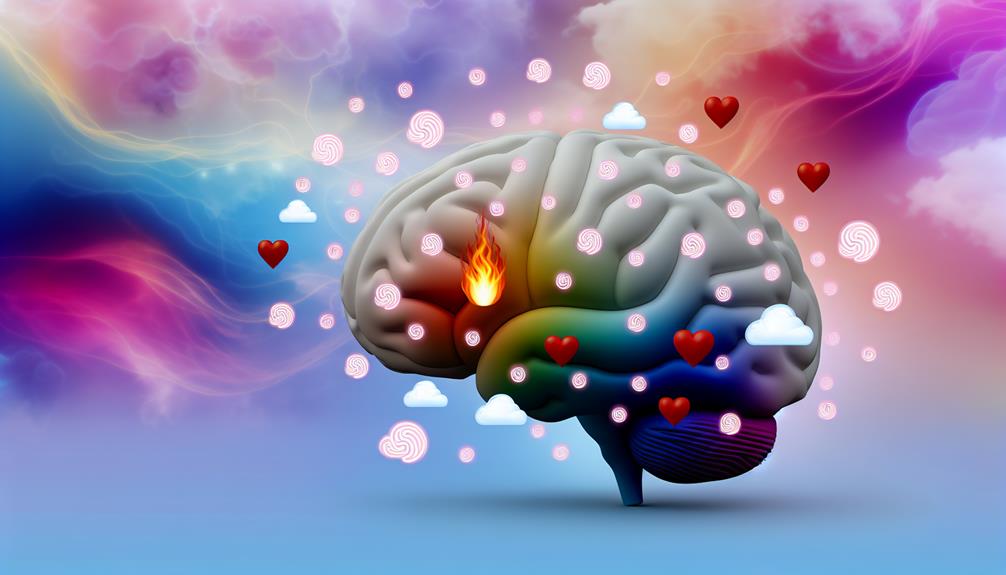Intense emotions are powerful experiences that can shape our mental health and daily interactions. These feelings, which include anger, sadness, fear, and joy, are influenced by various biological and environmental factors. Understanding the triggers behind these emotions is essential for effective management. Strategies such as mindfulness, cognitive reframing, and self-soothing techniques can help in regulating intense feelings. Additionally, building strong support networks and recognizing when to seek professional help are important steps. By enhancing emotional awareness, individuals can cultivate healthier responses to intense emotions, leading to improved well-being and relationships. Further insights can provide deeper understanding and practical approaches.
Key Takeaways
- Intense emotions can impact mental health, decision-making, and relationships, making emotional awareness essential for effective management.
- Identifying emotional triggers helps shift responses from reactive to proactive, fostering healthier emotional patterns.
- Mindfulness practices, such as mindful breathing and emotional journaling, enhance present moment awareness and regulate intense emotions.
- Building a support system with friends or family provides a safe space for sharing feelings and coping effectively.
- Seeking professional help, like therapy, is crucial when intense emotions become overwhelming or persistent, improving emotional regulation and well-being.
The Nature of Intense Emotions

Intense emotions, such as rage, joy, or despair, can be likened to a storm, sweeping through an individual's mental landscape and often leaving a lasting impact. These emotions, while fundamentally human, can challenge our emotional resilience—our ability to adapt and recover from stressful situations. When faced with extreme feelings, the capacity to understand and manage these emotions becomes crucial, highlighting the importance of emotional intelligence. Additionally, prolonged periods of intense emotions can lead to increased stress levels, which may weaken the immune system, making it essential to address emotional health proactively how stress affects immunity.
Emotional intelligence involves recognizing, understanding, and effectively responding to one's own emotions and those of others. This skill allows individuals to navigate intense emotions with greater awareness and empathy, fostering a sense of belonging and connection within social contexts. Research indicates that individuals with high emotional intelligence are better equipped to handle stress, communicate effectively, and maintain healthy relationships, all of which contribute to overall well-being.
Moreover, developing emotional resilience not only mitigates the adverse effects of intense emotions but also empowers individuals to embrace their emotional experiences as opportunities for growth. By cultivating both emotional intelligence and resilience, individuals can weather the storms of intense emotions, transforming challenges into pathways for deeper self-understanding and interpersonal connection.
Common Types of Intense Emotions
Emotions can vary considerably in intensity, with some of the most common types including anger, sadness, fear, and joy. Each of these emotions serves a distinct purpose in our lives and can elicit powerful physiological and psychological responses. Fear responses, for example, are crucial for survival, triggering a fight-or-flight mechanism that prepares us for danger. On the other hand, joy expressions foster connections and enhance our relationships, promoting a sense of belonging. Understanding how to manage intense emotions, especially in children, can lead to more effective communication and support steering ADHD with patience.
Anger management techniques are essential for steering intense feelings of frustration, while sadness coping strategies can support resilience during challenging times. Similarly, anxiety relief methods, such as mindfulness and breathing exercises, can help regulate overwhelming emotions. Excitement regulation is equally important, allowing individuals to harness their enthusiasm without becoming impulsive.
In relationships, love connection fosters emotional security, although guilt processing can complicate these bonds. Surprise reactions can also be intense, bringing both positive and negative experiences. Understanding these common types of intense emotions allows individuals to develop better emotional awareness, ultimately leading to healthier emotional regulation and a stronger sense of community and support.
The Science Behind Emotions

Understanding the science behind emotions involves examining the neurobiology that underpins emotional experiences and the specific triggers that elicit these responses. Our emotional responses can often feel like levels in a video game, where each experience can lead to different outcomes based on the choices we make. Research indicates that our brain's structure and chemistry play an essential role in shaping how we react emotionally, influencing our behaviors in significant ways. By analyzing these components, we can better appreciate the complexity of emotions and their profound impact on our daily lives life as a video game metaphor.
Neurobiology of Emotions
The neurobiology of emotions encompasses a complex interplay of brain structures, neurotransmitters, and neural pathways that shape our emotional experiences. Understanding these components is essential for emotional regulation, allowing individuals to navigate their feelings with greater insight and control. Key brain regions involved in emotion include the amygdala, responsible for processing fear and pleasure, and the prefrontal cortex, which plays a vital role in regulating emotional responses.
| Brain Structure | Function |
|---|---|
| Amygdala | Processes emotions like fear and joy |
| Prefrontal Cortex | Regulates emotional responses |
| Hippocampus | Involved in memory formation and context |
| Insula | Integrates emotional awareness |
| Nucleus Accumbens | Governs reward and pleasure pathways |
Neurotransmitters such as serotonin and dopamine greatly influence our emotional states, impacting our overall well-being. By fostering healthy neural pathways through mindfulness and adaptive coping strategies, we can enhance our emotional regulation skills. This understanding not only promotes personal growth but also fosters a sense of belonging within our communities, as we learn to support one another in managing the intricate tapestry of human emotions.
Emotional Triggers Explained
Identifying emotional triggers is essential for individuals seeking to navigate the complexities of their feelings. Emotional triggers are specific stimuli—whether they be events, interactions, or memories—that provoke intense emotional responses. Understanding these triggers is fundamental to developing emotional resilience, as it empowers individuals to anticipate and manage their reactions effectively.
Research indicates that emotional triggers often stem from past experiences, which can evoke feelings such as anger, sadness, or anxiety. For instance, a familiar setting may remind someone of a traumatic event, leading to an immediate emotional response. Trigger awareness allows individuals to recognize the connections between their feelings and external stimuli, fostering a deeper understanding of their emotional landscape.
Moreover, cultivating emotional resilience through trigger awareness can transform one's emotional responses from reactive to proactive. This shift enables individuals to respond to triggers with mindfulness, rather than impulsivity, thereby enhancing their overall well-being. By acknowledging and addressing emotional triggers, individuals can create healthier emotional patterns, ultimately fostering a sense of belonging within themselves and their communities. Understanding the science behind these triggers is a crucial step towards achieving a balanced emotional state and enriching interpersonal relationships.
Impact on Behavior
Emotions greatly impact behavior, influencing decision-making, interpersonal interactions, and overall mental health. Emotional regulation plays an important role in shaping behavior patterns, as individuals who effectively manage their emotions tend to demonstrate healthier coping mechanisms. Conversely, those struggling with emotional expression may experience heightened stress responses, leading to negative behavioral outcomes, such as withdrawal or aggression.
Research highlights the significance of emotional intelligence and self-awareness in fostering positive social interactions. By recognizing and understanding their own emotions, individuals can better navigate their feelings and respond to others with empathy and compassion. This not only strengthens personal relationships but also contributes to resilience building, enabling individuals to withstand life's challenges more effectively.
Moreover, the ability to articulate emotions can enhance communication, promoting deeper connections and a sense of belonging. As we cultivate our emotional intelligence, we can develop healthier behavior patterns that support both our well-being and that of those around us. In conclusion, understanding the impact of emotions on behavior is essential for fostering emotional regulation and improving social dynamics, ultimately leading to a more fulfilling and connected life.
Triggers of Intense Feelings
Understanding the triggers of intense feelings is essential for effective emotional management. Personal experiences and memories, environmental influences, and biological factors all play significant roles in shaping emotional responses. Additionally, engaging in flexible work environments, such as remote customer service roles, can help individuals manage their stress and emotional triggers more effectively. By examining these elements, individuals can better recognize their emotional patterns and develop strategies for coping with intense feelings.
Personal Experiences and Memories
Personal experiences and memories often serve as powerful triggers for intense feelings, shaping our emotional landscapes in profound ways. Memory recall can evoke emotional nostalgia, bringing past experiences vividly to life. Such recollections often reveal the intricacies of our emotional connections, highlighting how moments from our past can influence our present emotional state.
Memory triggers can initiate a cascade of emotions, sometimes unexpectedly. Personal storytelling serves as a way to process these experiences, allowing individuals to articulate their feelings and foster understanding within themselves and others. Engaging in reflective journaling can further facilitate this process, providing a safe space for exploration and meaning-making. This practice also aids in sentiment analysis, helping to identify patterns in emotional responses tied to specific memories.
Understanding the role of personal experiences in shaping our emotions enables us to cultivate greater emotional awareness. By recognizing these triggers, we can develop strategies to manage our feelings more effectively. Ultimately, acknowledging our emotional past fosters belonging and connection, reminding us that shared experiences can unite us in our humanity.
Environmental Influences and Changes
Several environmental factors can greatly influence our emotional responses, often serving as potent triggers for intense feelings. Social settings, such as gatherings or community events, can evoke feelings of belonging or isolation, shaping our emotional landscape. Seasonal changes also play a pivotal role; for instance, the arrival of spring may uplift spirits, while the onset of winter can exacerbate feelings of sadness or loneliness.
Cultural influences further contribute to our emotional experiences, as societal norms dictate acceptable emotional expressions. Environmental stressors, such as noise pollution or overcrowding in urban living, can amplify anxiety and frustration. Conversely, exposure to natural surroundings has been shown to foster calmness and promote emotional well-being.
The climate impact cannot be overlooked, as extreme weather events may induce feelings of fear and helplessness within communities. Understanding community dynamics, including the support systems available, can help mitigate these intense emotions. By recognizing how these environmental influences shape our emotional responses, we can better navigate our feelings and foster resilience, ultimately enhancing our sense of belonging in an ever-changing world.
Biological and Chemical Factors
Biological and chemical factors play an essential role in triggering intense emotions, as they underpin the physiological responses that shape our feelings. Hormonal balance is critical; fluctuations in hormones can considerably influence emotional experiences. For example, cortisol levels rise in response to stress, heightening feelings of anxiety or fear, while serotonin impacts mood regulation, often linked to feelings of well-being.
Neurotransmitter roles are also fundamental in understanding emotional responses. Dopamine effects, tied to pleasure and reward, can lead to intense joy or frustration when expectations are unmet. In addition, genetic predispositions may predispose individuals to heightened emotional sensitivity, as established by evolutionary psychology, which suggests that such traits may have been advantageous for survival.
Our brain chemistry is a complex interplay of these factors, influencing emotional regulation and responses to external stimuli. The interplay of these biological components underscores the necessity of recognizing and managing our emotional landscape. Understanding these triggers can foster a sense of belonging and empathy, as we navigate our emotional experiences and those of others, ultimately promoting healthier emotional responses and connections.
Impact on Daily Life

Intense emotions can profoundly disrupt daily life, affecting various aspects such as work performance, relationships, and mental well-being. When individuals experience heightened emotional states, their ability to function effectively diminishes. This can lead to decreased productivity, strained interpersonal connections, and increased vulnerability to mental health issues. Developing emotional resilience is essential in mitigating these effects and fostering effective daily coping strategies.
| Aspect of Life | Impact of Intense Emotions |
|---|---|
| Work Performance | Decreased focus and productivity |
| Relationships | Heightened conflicts and misunderstandings |
| Mental Well-Being | Elevated stress and anxiety levels |
| Social Interactions | Withdrawal from social connections |
| Decision Making | Impaired judgment and impulsive choices |
Understanding the repercussions of intense emotions is significant for fostering a supportive environment. Emotional resilience can be nurtured through self-awareness and connection with others, offering a sense of belonging. By recognizing the impact of emotional fluctuations, individuals can begin to develop strategies for daily coping, allowing them to navigate life's challenges more effectively while maintaining their well-being.
Strategies for Managing Emotions
Although steering through intense emotions can be challenging, employing effective strategies for managing them is vital for maintaining overall well-being. One fundamental approach is emotion regulation, which encompasses various coping mechanisms tailored to individual needs. Techniques such as self-soothing and mindfulness practices can foster emotional resilience, allowing individuals to process their feelings constructively. Remarkably, public figures like Taylor Swift have shown how emotional connections can thrive even in high-pressure environments, such as her appearances at Chiefs games, highlighting the importance of support and community in emotional well-being.
Expressive writing and emotion journaling serve as powerful tools for articulating complex emotions, facilitating clarity and understanding. By engaging in cognitive reframing, individuals can shift their perspectives, transforming negative thought patterns into more positive, actionable insights. This not only aids in emotional regulation but also enhances problem-solving capabilities.
In addition, nurturing robust support systems plays an important role in emotional management. Building connections with empathetic friends or family members can provide a safe space for sharing and processing feelings. Finally, identifying healthy outlets for emotional release—such as exercise, art, or music—can greatly contribute to overall emotional well-being. By integrating these strategies, individuals can cultivate a balanced emotional landscape, fostering a sense of belonging and promoting resilience in the face of life's inevitable challenges.
Mindfulness and Emotional Awareness

Developing emotional awareness is a pivotal aspect of effective emotional management, closely linked to mindfulness practices. Mindfulness fosters present moment awareness, enabling individuals to observe their emotions without judgment. Techniques such as mindful breathing can ground us, creating a space between stimulus and response, allowing for thoughtful reflection rather than impulsive reactions.
Emotional journaling serves as a powerful tool to articulate feelings, enhancing emotional validation and understanding. By regularly documenting experiences, individuals can identify patterns and triggers, promoting deeper self-awareness. Complementing this, self-compassion practices encourage a nurturing approach towards oneself, reducing the harsh self-critique often associated with intense emotions.
Incorporating meditation techniques and body awareness allows for heightened sensitivity to physical sensations linked to emotional states. Grounding exercises, such as focusing on tactile sensations, help anchor us when emotions become overwhelming. Mindful observation fosters an attitude of curiosity and acceptance, while reflective listening in interpersonal interactions enhances emotional connection and understanding.
Together, these practices not only cultivate emotional awareness but also enrich our sense of belonging, fostering empathy and connection within ourselves and with others. By embracing these strategies, we can navigate our emotional landscapes with greater clarity and compassion.
Seeking Professional Help
Recognizing when to seek professional help is an essential step in managing intense emotions effectively. For many individuals, traversing emotional turmoil can feel isolating and overwhelming. The decision to pursue therapy options, such as cognitive-behavioral therapy or dialectical behavior therapy, can provide invaluable emotional support and guidance. Research indicates that engaging with a trained mental health professional can lead to significant improvements in emotional regulation and overall well-being.
Therapy offers a safe space to explore feelings without judgment, fostering a sense of belonging that many individuals crave. It is vital to identify signs that professional help may be necessary, such as persistent feelings of sadness, anxiety, or anger that interfere with daily life. Additionally, if emotional distress leads to self-harm or thoughts of harming others, immediate intervention is essential.
The process of seeking help can vary; individuals may find comfort in group therapy settings, which offer community support, or individual sessions tailored to personal needs. Whatever the choice, accessing professional help is a proactive step towards understanding and managing intense emotions, ultimately leading to healthier coping mechanisms and a more fulfilling life.
Frequently Asked Questions
Can Intense Emotions Be Inherited or Passed Down Through Families?
Intense emotions may indeed have a genetic predisposition, as research suggests that emotional responses can exhibit familial patterns. This indicates that individuals may inherit certain traits influencing their emotional intensity. Additionally, environmental factors within families can amplify these inherited predispositions, creating a complex interplay between genetics and upbringing. Understanding this connection fosters empathy and belonging, highlighting the shared experiences among family members and the importance of supportive environments in managing emotional challenges.
How Do Cultural Differences Influence the Expression of Intense Emotions?
Cultural differences greatly influence the expression of intense emotions through established cultural norms that dictate acceptable behaviors. For instance, collectivist societies may prioritize emotional restraint to maintain group harmony, while individualistic cultures often encourage open emotional expression as a means of self-assertion. This variance can lead to misunderstandings in cross-cultural interactions, highlighting the importance of empathy and awareness in appreciating diverse emotional expressions, fostering a sense of belonging and connection among individuals.
Are There Age-Related Changes in Experiencing Intense Emotions?
Age-related changes considerably influence the experience of intense emotions. During childhood development, individuals often exhibit heightened emotional responses, gradually cultivating emotional resilience over time. Adolescents may experience intensified emotions due to hormonal changes and social pressures, while adults typically develop better emotional regulation strategies. This evolution reflects a natural progression, allowing individuals to navigate complex emotional landscapes more effectively, fostering a sense of belonging and connection through shared experiences and increased empathy as they age.
Can Intense Emotions Affect Physical Health Long-Term?
Intense emotions can greatly impact physical health over the long term. Prolonged activation of the stress response, driven by unmanaged emotional states, can lead to various health issues, including cardiovascular problems and weakened immune function. Effective emotional regulation is essential in mitigating these risks, as it enables individuals to navigate intense feelings constructively. By fostering emotional awareness and adaptive coping strategies, individuals can promote both emotional well-being and physical health, contributing to a more balanced life.
What Role Does Journaling Play in Emotional Processing?
Journaling serves as a valuable tool in emotional processing by promoting emotional clarity and facilitating self-reflection. Through the act of writing, individuals can articulate their thoughts and feelings, allowing for a deeper understanding of their emotional experiences. This practice often yields therapeutic benefits, such as reduced anxiety and improved mood. In addition, journaling fosters a sense of belonging by creating a safe space for individuals to explore and validate their emotions.





